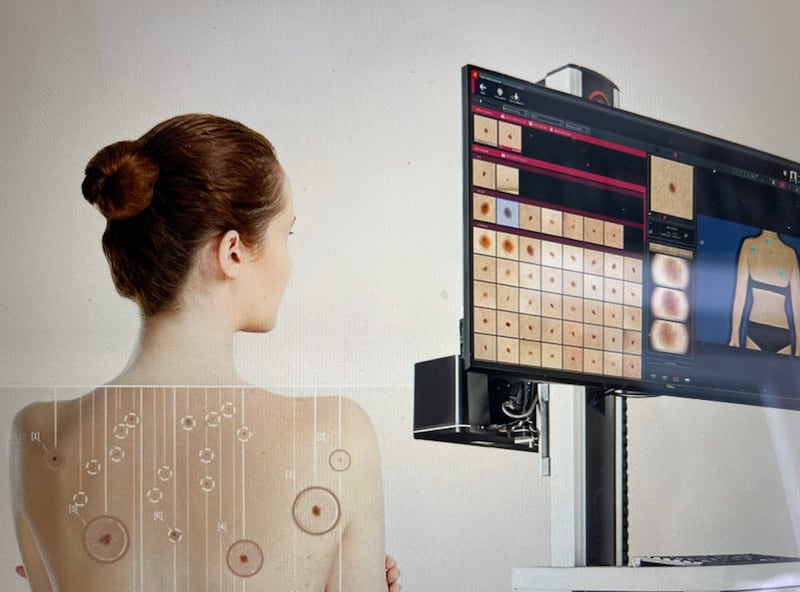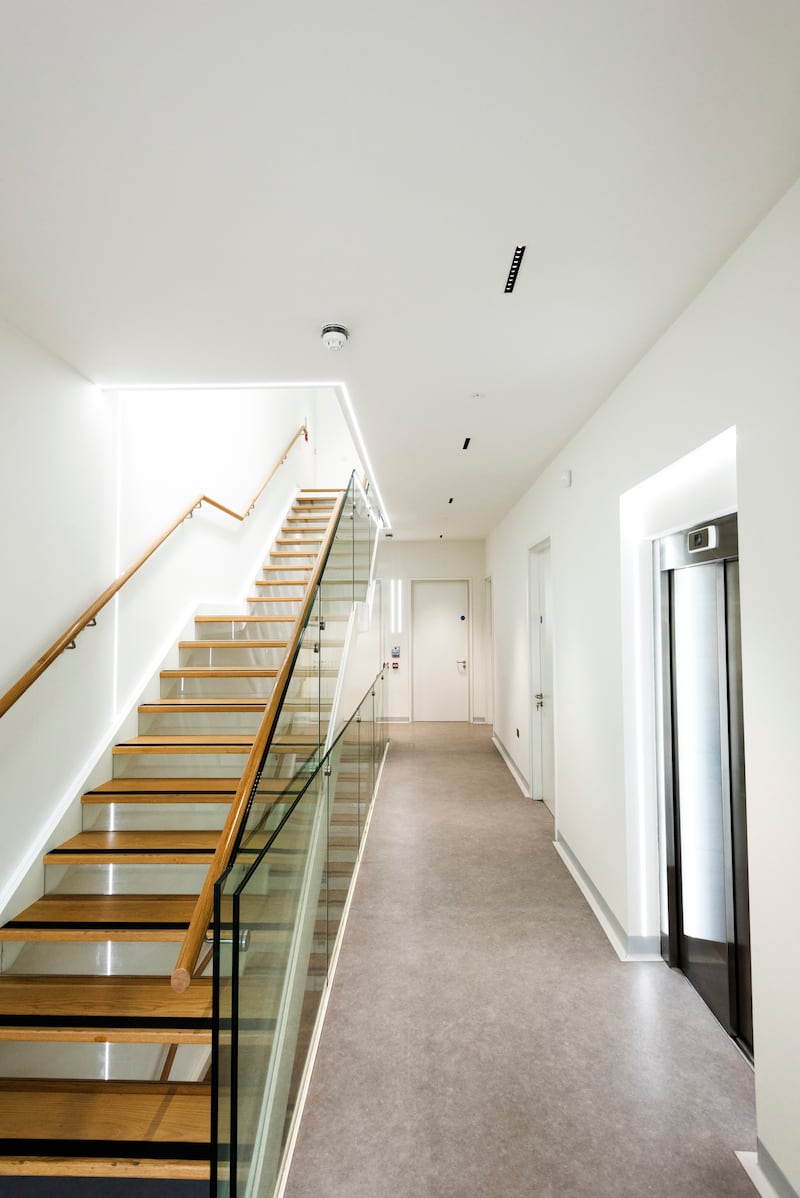BELFAST Skin Clinic is an award winning, state of the art, purpose-built facility, which is owned and run by consultant dermatologist, Dr Pamela McHenry.
Dr McHenry has over 25 years’ experience specialising in the treatment of all skin problems including acne, rosacea, eczema, psoriasis, skin ageing and skin cancer.
After graduating from Queen’s University Medical School she spent four years training in general medicine and a further six years training in dermatology.
The private clinic, which was established in 2016, is dedicated to the management of all skin and skin related disorders. The ethos of the clinic has always been to provide the highest standards in staff, technology and work environment, with patient care central to everything.
With over 80 members of staff the practice brings together consultant dermatologists, plastic surgeons, vascular surgeons laser specialists, aesthetic practitioners, and rheumatologists. The clinic’s aim is to streamline care for every skin concern. Facilitating interaction and transfer of care between the different specialists that may be required in the patient journey, ultimately helping to deliver the optimum outcome for the patient.
“I had a vision of having integrated care,” explains Dr McHenry.
“Quite often if you go private to see somebody in dermatology and you need plastic surgery or vascular surgery the patients disappear off to somewhere else and they have completely separate notes.
“Having integrated care would mean that if I see patients who need plastic surgery I can talk to the plastic surgeon and because we’re all paperless they can access my notes and records and see what my thoughts are.”
The consultants are supported by a highly skilled nursing team who also play an important role in patient education. People travel from all over Ireland to the clinic and to date, over 30,000 patients have attended.

The clinic offers an extensive range of diagnostic and treatment services. Facilities include 10 consulting rooms, an operating theatre, laser suite and Mohs laboratory. Mohs surgery is a specialised method of treating skin cancer lesions to ensure complete cancer removal while minimising scar size.
It is the only private clinic in Northern Ireland to offer this form of treatment as well as skin cancer screening with full body mole mapping.
The clinic recently invested in the latest most advanced mole scanner.
“We’ve had a mole scanner since we first opened, and we’ve found it invaluable in assisting with the early detection of skin cancer. We are delighted to have recently invested in the latest updated model which can detect microscopic changes in moles” says Dr McHenry.
“Some people aren’t aware that a lot of melanomas appear as new lesions as opposed to changes in pre-existing moles.
“The mole mapping process allows us to photograph people from head to toe and highlights new lesions, as well as giving us extremely detailed information about changes that have occurred in pre-existing moles.
“The scanner can detect changes which aren’t obvious to the naked eye.”

Skin cancer incidence rates in the UK have more than doubled since the early 1990s. It is currently the most common form of cancer in Northern Ireland. There are two main types of skin cancer: melanoma and non-melanoma skin cancer. Melanoma is less common but has a greater chance of poorer outcome. Northern Ireland currently has the worst outcome from melanoma in the UK.
Prevention and early detection are critical to try and address this.
Dr McHenry explains that there are preventative measures people can take to reduce the risk of skin cancer.
“It is very important to avoid excess sun exposure. Just one episode of sunburn increases the risk of developing skin cancer.
“So the one thing dermatologists recommend is to use sunscreen all year-round, winter or summer because there’s still background Ultraviolet A coming from the sun which damages and ages your skin and can increase the risk of skin cancer.
- Red flag cancer referrals can never be delayed by new computer system again - Deirdre HeenanOpens in new window
- Why you should take part in the Belfast-based cancer study seeking to learn the lessons of the Covid-19 pandemicOpens in new window
- Anne Hailes: Don't take 'no' for an answer if you have cancer concernsOpens in new window
“Tanned skin is a sign of sun damage, and use of sunbeds is associated with an increased chance of getting skin cancer. It is advisable to avoid sunburn and tanning.”
Early detection can make the difference between life and death.
Dr McHenry recommends, as with other cancer screening advice, that you undertake self-checking of all your skin once a month, looking for any new, changing or non-healing lesions. Particularly check moles for change in size, shape and colour.
“Always look for the ugly duckling – when you look at your skin and you see something that stands out and looks really different from everything else, that’s always one to get checked out.
“That’s why we recently made a post about Bob Marley as he died because of melanoma that started under his toenail.”
As skin cancer can occur on any part of the body, help may be required for checking the back of the body as well as the feet. If you notice a new or changing lesion, don’t delay – seek advice about it as soon as possible.
“The problem is that for some skin cancers, even a month’s delay can affect the long-term outcome. This is why I like having the dermatologists and the plastic surgeons working closely together in the clinic.
“If I have a patient who has a lesion I’m really worried about, I can speak to the surgeon straight away and arrange surgery as soon as possible.”
Increasing numbers of patients are being proactive and attending dermatologists for skin checks and skin cancer screenings. The mole scanner assists with screening and is particularly useful for those with lots of moles, or with a personal or family history of skin cancer.
Belfast Skin Clinic also offers a full range of aesthetics treatments and has the most advanced laser hair removal system. In keeping with its ethos of using the latest technology, the clinic also recently invested in a Secret PRO (a pioneering technology combining micro needling, radiofrequency treatments and Fractional CO2 laser) to offer treatment for patients with scarring and skin ageing.

As well as decreasing patients’ waiting time, the clinic is also concerned with decreasing its carbon footprint. It is the only medical facility in Northern Ireland that is not fossil fuel dependent. Instead, the practice uses heat recovery ventilation and solar power.
So the clinic marries the highest standards of staff, technology, and environment.
“We had an idea that we wanted to be like the dermatology equivalent of the Mayo Clinic in Ireland,” adds Dr McHenry.
“When somebody thinks about medicine, they think of the Mayo Clinic because it’s recognised for being at the forefront of new developments and provides a very high standard of care.
“So that’s what we want people to think of when they think of the Belfast Skin Clinic – a centre of excellence.”
For further information see www.belfastskinclinic.com







